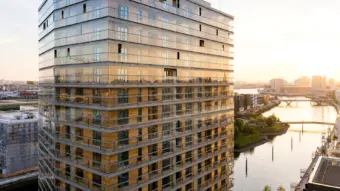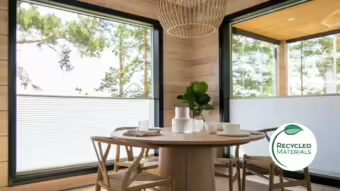Balcony glazing pays back its carbon footprint
19 Septemper 2012
Balcony glazing pays back its carbon footprint on average in 3 years 6 months already
It may take only a couple of years to reduce the carbon footprint for housing on a permanent basis, if the balcony has been furnished with glass panels. According to Ramboll Finland Oy’s study, the payback period for the emissions caused by the Lumon 5-type balcony glazing system during its life cycle is 1,2 – 9,7 years, on average in 3 years 6 months in Canada. The glazed balcony will bring savings in energy, and eventually in emissions. The payback period refers to the length of time required for these emission savings to equal the emissions generated during the product’s life cycle. After this, the balcony glazing’s net emissions will be negative, i.e. net proceeds available.
Lumon has become alert to energy and environmental issues
“Interest in energy savings and the carbon footprint of buildings has lately increased due to the directive guidance on energy efficiency. As a result of this, companies have become aware of these issues and had several studies carried out on the environmental properties of products. Lumon Oy has been alert to these issues at an early stage: an energy savings study was carried out in 2010, and a carbon footprint estimation in the spring of 2012. The former study revealed that balcony glazing saves energy. The latter study showed that the product is also advantageous with regard to the carbon footprint. In a way, the result was no surprise as the main balcony glazing materials, glass and aluminum, are totally recyclable. Another benefit is their existing and functional recycling system. At present, these materials are already successfully recycled,” sums up M.Sc. (Tech.) Kimmo Hilliaho, Energy Specialist and Leader of Research.
The starting point in the study’s carbon footprint estimation was a 64 sqm high-rise apartment in Tampere, Finland. The apartment is equipped with a typical Lumon 5-type balcony glazing system consisting of six glass panes. Thanks to glazing, the example object’s energy savings for the winter of 2009–2010 totaled 4.6 kWh/m2/a, while they amounted to an average of 1.9–10,4 kWh/m2/a in Finland.
Moreover, the study carried out by Ramboll deals with the consideration of the environmentally friendly properties of Lumon solutions when determining the points granted by the globally well-known LEED environmental certification system for properties.
Interview requests:
Olli Vänskä, CEO
Lumon North America Inc.
tel. +1 705 458 3020
fax +1 705 458 3022
toll free tel. 1 855 458 3020
olli.vanska@lumon.com
lumon.com
Kimmo Hilliaho, Energy Specialist
Ramboll Finland Oy
Tel. +358 400 780 909
-
[NEWS] Glazed balconies on the rise in Poland: Lumon strengthens presence with standout residential projects
Read more…Balcony glazing is fast becoming a hallmark of modern Polish residential architecture. Two years after establishing its subsidiary in Poland, Lumon – a global leader in frameless balcony glazing solutions – has successfully completed several high-profile residential projects, transforming urban living in cities like Warsaw, Łódź, and Pruszków.
-
Wooden buildings and glazed balconies: A perfect blend of design and sustainability
Read more…The architectural landscape is evolving, with sustainability and innovative design at the forefront. Wooden buildings, coupled with glazed balconies, offer a unique blend of natural materials and modern aesthetics. For the construction industry, this combination presents an exciting opportunity to create stylish, energy-efficient spaces that meet the growing demand for sustainable building solutions.
-
[NEWS] Visor launches a groundbreaking blinds collection with unique sustainability features
Read more…The Finnish company Suomen Visor Oy has launched a new line of window blinds made from recycled materials, featuring a record-low carbon footprint. The product is one-of-a-kind on the European market and answers the growing demand for high-quality, environmentally friendly sun shading solutions.


